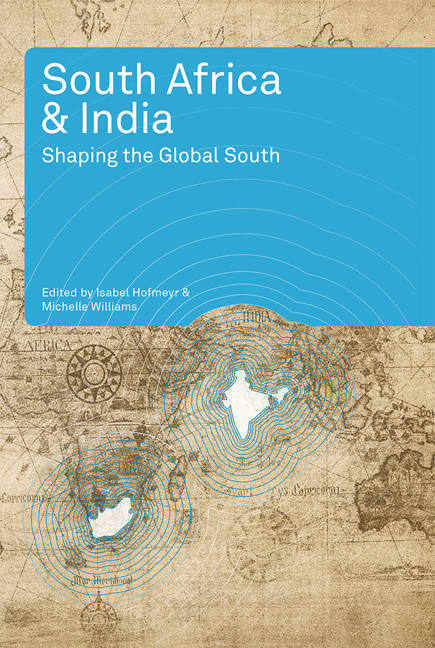Book contents
- Frontmatter
- Contents
- Acknowledgements
- Abbreviations and Acronyms
- Introduction
- Historical Connections
- Socio-political Comparisons
- Chapter 6 Renaissances, African and Modern: Gandhi as a Resource?
- Chapter 7 Democratic Deepening in India and South Africa
- Chapter 8 Local Democracy in Indian and South African Cities: A Comparative Literature Review
- Chapter 9 Reimagining Socialist Futures in South Africa and Kerala, India
- Chapter 10 Labour, Migrancy and Urbanisation in South Africa and India, 1900–60
- Conclusion
- Notes and References
- About the Authors
- Index
Chapter 10 - Labour, Migrancy and Urbanisation in South Africa and India, 1900–60
from Socio-political Comparisons
Published online by Cambridge University Press: 21 April 2018
- Frontmatter
- Contents
- Acknowledgements
- Abbreviations and Acronyms
- Introduction
- Historical Connections
- Socio-political Comparisons
- Chapter 6 Renaissances, African and Modern: Gandhi as a Resource?
- Chapter 7 Democratic Deepening in India and South Africa
- Chapter 8 Local Democracy in Indian and South African Cities: A Comparative Literature Review
- Chapter 9 Reimagining Socialist Futures in South Africa and Kerala, India
- Chapter 10 Labour, Migrancy and Urbanisation in South Africa and India, 1900–60
- Conclusion
- Notes and References
- About the Authors
- Index
Summary
Migrant labour, or, more specifically, the migrant labour system, has been identified by a broad spectrum of liberal and radical social scientists as the core institution of South Africa's 20th-century political economy. It has been credited with underpinning white prosperity and white supremacy alike: white prosperity in the sense that the ultra-cheap ‘bachelor’ wages that could be paid to oscillating African labour migrants who left their families behind in the African reserves guaranteed impressive profits for both gold mining and later other industries, which were, by various mechanisms, spread across most sectors of white society; white supremacy because migrancy prevented Africans from settling in the bastions of white power in the towns and allowed the denial of political rights to virtually all Africans outside the reserves. In the majority of these accounts labour migrancy has been pictured as being either constrained or coerced. Land alienation, finally ratified by the 1913 Land Act, confined Africans to 8.7 per cent of South Africa's land, thereby precluding or inhibiting the independent reproduction of families in the reserves. The poll tax, which eventually climbed to £1, 10 shillings a year in 1925 and could be paid only in cash, forced Africans on the migrant labour market to earn wages, and a host of mechanisms such as the recruiting monopoly instituted by the Chamber of Mines in the early 20th century; the maximum average wage system by which members of the Chamber of Mines agreed to place a ceiling on the aggregate African wage bill; the labour contract system, which imposed criminal sanctions for breaches of it; single-sex compounds to accommodate migrants; and passes capped migrant earnings and prevented them from creeping up over time (Wolpe, 1972; Johnstone, 1976; Legassick, 1977). As a result, as Francis Wilson (1972:46) famously observed, African gold miners’ wages remained static in real terms between the early 1900s and the late 1960s.
This somewhat stark and instrumental view of the role of migrant labour in South Africa's political economy has been given greater nuance in important respects in the last twenty or so years.
- Type
- Chapter
- Information
- South Africa and IndiaShaping the Global South, pp. 219 - 242Publisher: Wits University PressPrint publication year: 2011



